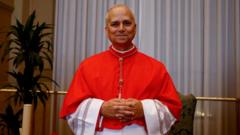In an unprecedented move, Cardinal Robert Francis Prevost has been elected as the 267th pope, taking the name Leo XIV, and making history as the first American to lead the Roman Catholic Church.
**Historic Election: Cardinal Prevost Becomes First American Pope**

**Historic Election: Cardinal Prevost Becomes First American Pope**
Cardinal Robert Francis Prevost is elected as Pope Leo XIV, marking a significant moment for the Catholic Church and its 1.4 billion followers globally.
In a day marked by excitement and jubilation, Cardinal Robert Francis Prevost was elected as the 267th pope of the Roman Catholic Church on May 8, 2025. Taking on the name Pope Leo XIV, he made history as the first American pontiff, a milestone considered unthinkable by many.
His election came on the second day of the conclave, with the 133 cardinals casting their votes after a little over 24 hours of deliberation, leading to a plume of white smoke from the Sistine Chapel signaling the choice. Previous expectations had speculated about candidates from more traditionally leading Catholic nations but the election of Prevost, a Chicago native, has turned heads globally.
In his first public address from the Vatican balcony, Pope Leo XIV emphasized peace and unity among the church and its followers. "Peace be with you," he declared, urging the faithful to embrace love, dialogue, and collaboration. With his focus on inclusion and leaning towards the compassionate strategies of his predecessor, Pope Francis, Leo XIV is expected to navigate the complexities of a church in transition.
Prevost, 69, grew up in Chicago and has dedicated over two decades of his life serving in Peru, where he became a bishop and gained naturalized citizenship. Friends and supporters have praised his ability to connect with the needs of communities and his inclusive approach to church leadership.
Celebrations erupted not only in Rome but across the United States, with particularly heartfelt reactions from the Chicago area, where his journey to the papacy began. Throughout the U.S., reactions varied widely, with some embracing the prospect of an American pope as a fresh narrative within the historic institution, while others expressed uncertainty about the implications of his election amidst geopolitical tensions.
As the new pontiff prepares to address pressing issues within the church, including its stance on contemporary social issues, his leadership style and decisions will undoubtedly leave a mark on the future of Catholicism both in America and worldwide.
His election came on the second day of the conclave, with the 133 cardinals casting their votes after a little over 24 hours of deliberation, leading to a plume of white smoke from the Sistine Chapel signaling the choice. Previous expectations had speculated about candidates from more traditionally leading Catholic nations but the election of Prevost, a Chicago native, has turned heads globally.
In his first public address from the Vatican balcony, Pope Leo XIV emphasized peace and unity among the church and its followers. "Peace be with you," he declared, urging the faithful to embrace love, dialogue, and collaboration. With his focus on inclusion and leaning towards the compassionate strategies of his predecessor, Pope Francis, Leo XIV is expected to navigate the complexities of a church in transition.
Prevost, 69, grew up in Chicago and has dedicated over two decades of his life serving in Peru, where he became a bishop and gained naturalized citizenship. Friends and supporters have praised his ability to connect with the needs of communities and his inclusive approach to church leadership.
Celebrations erupted not only in Rome but across the United States, with particularly heartfelt reactions from the Chicago area, where his journey to the papacy began. Throughout the U.S., reactions varied widely, with some embracing the prospect of an American pope as a fresh narrative within the historic institution, while others expressed uncertainty about the implications of his election amidst geopolitical tensions.
As the new pontiff prepares to address pressing issues within the church, including its stance on contemporary social issues, his leadership style and decisions will undoubtedly leave a mark on the future of Catholicism both in America and worldwide.























